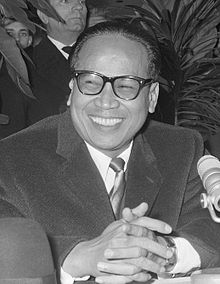Subandrio
| Subandrio | |
|---|---|

Subandrio in 1964
|
|
| 10th Foreign Minister of Indonesia | |
|
In office 9 April 1957 – 28 March 1966 |
|
| President | Soekarno |
| Preceded by | Roeslan Abdoelgani |
| Succeeded by | Adam Malik |
| Personal details | |
| Born |
15 September 1914 |
| Died | 3 July 2004 (aged 89) |
| Nationality | Indonesia |
| Profession | Diplomat |
| Religion | Islam |
Subandrio (15 September 1914 – 3 July 2004) was an Indonesian politician and Foreign Minister and First Deputy Prime Minister of Indonesia under President Sukarno. Removed from office following the failed 1965 coup, he spent 29 years in prison.
The spelling "Subandrio" has been official in Indonesia since 1947 but the older spelling Soebandrio is still sometimes used.
Subandrio was born in Malang, East Java, and educated at the Sekolah Tinggi Kedokteran Jakarta (GHS) in Jakarta. As a medical student he was active in the movement for independence. During World War II, while practicing medicine, he worked with anti-Japanese resistance forces. After the war he was appointed secretary-general of the information ministry.
After 1945 Subandrio became a supporter of the nationalist leader Sukarno, and was sent as Sukarno's special envoy in Europe, establishing an information office in London in 1947. From 1954 to 1956, he was ambassador to the Soviet Union. During this time he developed strong left wing views, although he was never a Communist as later alleged.
In 1956 Sukarno recalled him to Jakarta to become secretary-general of the foreign ministry, and then Foreign Minister. In 1960 he was also made Second Deputy Prime Minister, and in 1962 he was appointed Minister for Foreign Economic Relations. He held all three posts, and also acted as intelligence chief, until 1966.
Subandrio was the main architect of Indonesia's left-wing foreign policy during this period, including the alliance with the People's Republic of China and the policy of "Confrontation" with Malaysia, which created great hostility between Indonesia and the western powers, particularly the United States and the United Kingdom. He was heavily involved in the Sunda Straits Crisis of 1964, when the British aircraft carrier HMS Victorious passed through Indonesian waters without proper approval.
...
Wikipedia
